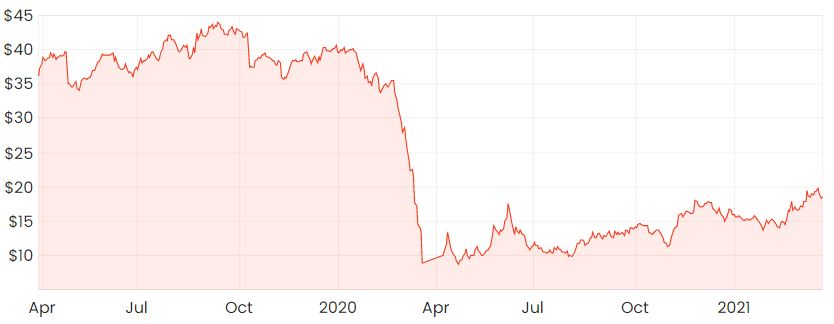The Flight Centre Travel Group Ltd (ASX: FLT) share price has taken off recently, going up by almost 40% since the start of February.
Considering Flight Centre shares used to trade at around $40 per share prior to COVID-19, does this mean there’s still plenty of upside left?
FLT share price

Recent developments
Despite the fact COVID-19 has brought international travel almost to a standstill, it seems as though travel companies such as Flight Centre, Webjet Limited (ASX: WEB), Corporate Travel Management Ltd (ASX: CTD) and Qantas Airways Limited (ASX: QAN) have done a good job to preserve cash levels and prepare for a global reopening play as the vaccine rollouts continue.
My colleague Raymond Jang recently wrote about how Flight Centre is continually reinvesting in technology, which you can read about here.
To me, it makes sense companies like Flight Centre are trying to improve their booking platforms and other forms of technology even though the pandemic is still a major headwind.
As businesses emerge from COVID-19, many of the smaller travel companies may not have had sufficient capital to withstand such a long period of reduced cashflows.
As unfortunate as this for the businesses that weren’t able to stay afloat, this presents an opportunity for some of the larger players to capture some additional market share and re-emerge as an even stronger player in the game.
What about Flight Centre’s valuation?
Given Flight Centre’s shares used to trade at around $40 pre-COVID, it may be logical to think that the current valuation implies a lot of potential upside.
In a recent article, I wrote about Zip Co Ltd (ASX: Z1P), I mentioned how valuing a company’s shares based on what they used to trade at isn’t always a reliable method of valuation. Firstly, there’s an assumption that shares were fairly valued to start with.
But also, sometimes we need to look one step further and observe a company’s market capitalisation rather than its share price, which equals the number of shares outstanding, multiplied by the current share price.
The important thing to note with companies like Flight Centre and Webjet is they’ve both nearly doubled the number of shares outstanding as they’ve needed to raise capital to stay afloat during COVID-19.
When calculating profit on a per-share basis, these companies are likely to experience a 50% decrease in earnings per share (earnings = profit). In other words, this has a dilutive effect on the existing shareholders of the company.
https://education.rask.com.au/2020/01/09/what-does-eps-mean-and-how-do-i-calculate-it/
To say that in even simpler terms: Today, you’re able to buy Flight Centre’s shares much cheaper than they were prior to the pandemic, but the amount of profit each share generates for the company is roughly 50% less due to this dilutive effect.
Summary
Keep in mind, none of what I’ve mentioned is to say that Flight Centre’s shares won’t do well over the next five to ten years. In fact, I’m fairly confident about the long-term recovery of many of the larger travel companies.
The point is simply to emphasise that observing the current share price of a company isn’t always the best measure of value in all cases.
If you’re interested in other ASX growth shares, I’d recommend signing up for a free Rask account to gain access to our stock reports.
For more share ideas: click here to read: 3 ASX growth shares I’d happily buy this week.










